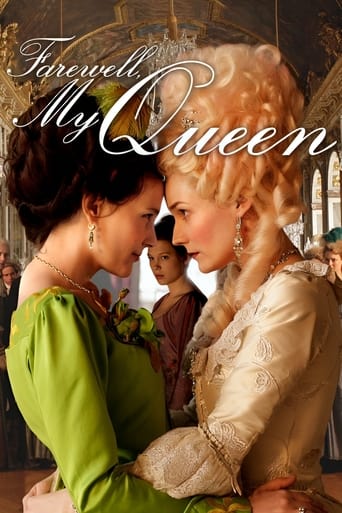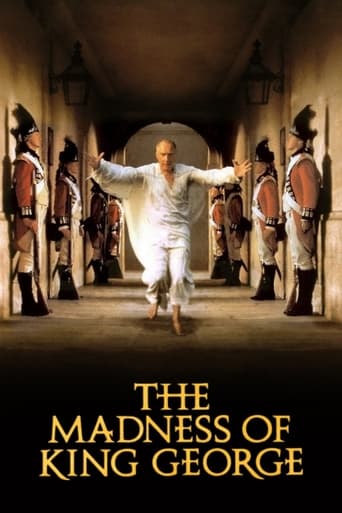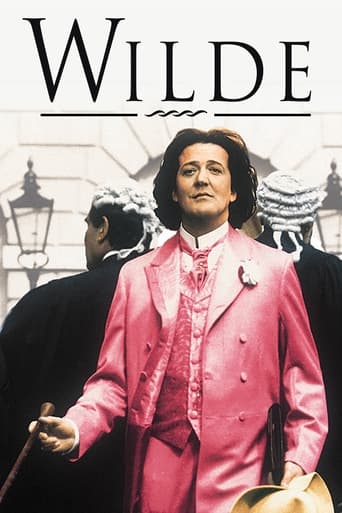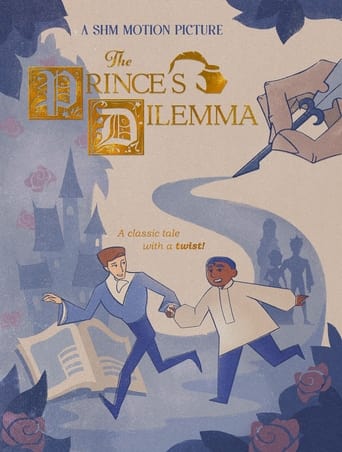

Farewell, My Queen (2012)
A look at the relationship between Marie Antoinette and one of her readers during the final days of the French Revolution.
Watch Trailer
Cast


Similar titles
Reviews
Better Late Then Never
The film may be flawed, but its message is not.
It's funny, it's tense, it features two great performances from two actors and the director expertly creates a web of odd tension where you actually don't know what is happening for the majority of the run time.
Great story, amazing characters, superb action, enthralling cinematography. Yes, this is something I am glad I spent money on.
Benoît Jacquot's Berlin Golden Bear contender in 2012, FAREWELL, MY QUEEN taps into a beguiling re-imagination of Marie Antoinette's (Kruger) impassioned affinity with Gabrielle de Polastron, duchess de Polignac (Ledoyen), on the eve of the French Revolution in 1789, without delving into more scandalously graphic details of their lesbian relationship, and unlike Sofia Coppola's palatially sumptuous MARIE ANTOINETTE (2006), Jacquot complies to Chantal Thomas' source novel and the film narrates entirely from the viewpoint of the Queen's young servant Sidonie Laborde (Seydoux), who often reads for her, which signifies that preponderantly viewers are invited to get a peep of the back rooms of Palace of Versailles for a change.Needless to say, the royal mise-en-scène has its sublime allure to those addicted to the period grandeur, often in passing glimpses wherever Sidonie drifts around in her fretful steps, this proves to be a cunningly economical stratagem of shifting the focus to the characters' mood swings when an impending uprising is in the pipeline. All hell broke loose therein, but not Sidonie, she remains inexorably loyal to Marie Antoinette after has been privileged with a tête-à-tête by the Queen in person, which the latter confides to her the affection she feels for Gabrielle. It makes her feel special about herself, it also thrills her sexually, to be granted such a honor which is out of her rung, she becomes the closest friend of the Queen of France, what more can a girl of her place want?Given the frenzied context, Sidonie barely has time to relish the joy, she puts her back into fishing latest information of the revolution, voluntarily running errands for the Queen, including waywardly barging into Gabrielle's boudoir and glaring her naked body with a trenchant incisiveness of jealousy and disparagement. But what does her "specialness" really mean to the Queen? When Marie Antoinette bestows her the ultimate mission, it hits her like a sledgehammer, inwardly, she might have a faintest hope that Marie Antoinette would indulge her like a forbidden fruit, in a more peaceful time, maybe, but not at that crunch, when monarchy is hanging by a thread, all she can do is to silently accept her fate as an honored decoy, the last thing she could ever do for her Queen, then for the first time in her life, she wallows in her moment of superiority, however facile and ominous it is, and the story just ends there, when she forever departs from Marie Antoinette's life, she, Sidonie Laborde, becomes a nobody.Admittedly, the film feels foreshortened, even myopic when considering such a sensational commotion is undergoing, there must be something more theatrically pressing can be projected on the screen (even Marie Antoinette's own story has many colorful facets), but in this unapologetically feminist reconstruction, Jacquot gallantly attempts to deconstruct the undertow of this particular situation (from a servant's perspective) fraught with attraction, disaffection, perturbation and self-deception, exclusively among women from different strata.Léa Seydoux gives a patchy incarnation of Sidonie, often casts her customarily inscrutable gaze masked with an air of stuck-up insouciance to the camera, but short in supply when a young maiden's ingenuousness is demanded, she seems more impenetrable than all her more worldly seniors, which considerably deflects Sidonie from being a queen-stuck virgin as she is. Diana Kruger, as her antithesis, contrives a much more rounded interpretation of the Queen, a mellow amalgam of personable femininity and fickle monarchist, an incorrigible romantic and a well- adjusted planner, that's only garnered from her fitful screen-time, and leaves us hot to trot to envision what she would be doing before her ill-fated sign-off. Perhaps a revisit of Coppola's work can quench the yearning, or otherwise.
Despite having a great interest in the late 18th century, I have not found many films that strike my particular chords. 'Les adieux à la reine' is one of them, and it does so mainly for two reasons: first, because it nicely shows us the dark underbelly of the lavish gold-plated upper rooms of the French royal palace at Versailles, exposing the system that contradicted the later observation by that inveterate revolutionary Thomas Jefferson, who was the American minister to France from 1785 to 1789, that: 'the mass of mankind has not been born with saddles on their backs, nor a favored few booted and spurred, ready to ride them legitimately, by the grace of God.' Second, because it shows us that for all their faults, the royals and their noble entourage where people too. People who did not voluntarily run for office, who loved their children and friends as much as anyone else would, and whose fears of what might be done to their loved ones and themselves drove them to nightmares and tears. Even if it was true that 'Louis must die that the country may live', as that great butcherer of men, Maximilien Robespierre, later remarked, the violent character of the French Revolution must surely have done great damage to their proclaimed ideals as well.Some have criticized the two main actresses for appearing stiff and lacking spontaneity; and I can certainly see where that is coming from, but rather than seeing this as a negative, I think it works to illustrate the strict protocols and the ever present divides of class and status that permeate life at Versailles. With one notable exception, the personal opinions and whims of Sidonie Laborde (Léa Seydoux) are simply not tolerated by anyone other than her fellow servants. A seeming relaxed and smiling social better instantly turns on her the moment she does anything deemed unacceptable, and when she finally does 'win the love' of Queen Marie Antoinette (Diane Kruger) it is for reasons completely out of line with what Sidonie might have wished for, but should probably have come to expect.Because if there is one thing about the character of Sidonie that I would criticize, it is exactly that: for someone seemingly so inquisitive, so observant of social protocol, and yet so willing to force her will through at certain times, she appears completely unable to assert herself around Queen Marie Antoinette - even when the rats are leaving the sinking ship, to use a Dutch expression. But perhaps this is unfair: perhaps she really did feel unconditional love towards the Queen.Speaking of love, who can fault Queen Marie Antoinette for being completely swept off her feet by Yolande Martine Gabrielle de Polastron, 'la duchesse de Polignac' (Virginie Ledoyen). The movie seems to portray her as a somewhat more recent and distant presence at the court than she was in reality, but regardless, it gives the viewers a peak into the upper layers of society at Versailles. If the adage 'play or be played' is too modern a description, something more contemporary would surely have conveyed the same idea.All in all, I consider this to be a fine film indeed. Diane Kruger gives us one of the more believable portrayals of Queen Marie Antoinette in recent times. If nothing else, acknowledgement of the fact that she was a mother in her mid-30s, and not a frivolous 20 year old, is a good start. But the film goes further, probably in line with the recent trend among historians to view Queen Marie Antoinette in a more positive light.One final note about the supposed pornographic nature of some scenes, pointed out in the reviews of others (mostly Americans); there is nudity, a kiss, and some longing stares. But this is nothing out of the ordinary in French, and indeed most European, films. Don't miss out on this film for fear of seeing a naked torso!
In film alone there have been eight representations depicting the life and times of Marie Antoinette. Benoit Jacquot's latest interpretation comes from a screenplay that he and Gilles Taurant adapted from Chantal Thomas's novel. Filmed largely at Versailles it looks closely at the class divide between monarch and servant and how blind love can distort your view. It's told from the point of view of a servant blindly committed to her Queen. Visually sumptuous with a compelling narrative it skilfully avoids the dullness of many period dramas.The story takes place during the last four days leading up to the French Revolution. Culminating in the overthrow of the monarchy and the execution of the King and Queen of France. A young woman Sidonie (Lea Seydoux) is the official reader to the Queen. She is Marie Antoinette's (Diane Kruger) number one fan. Scratching away at mosquito bites and grimacing at the site of a giant rat lurking in the servant's quarters she chooses to ignore all the rumblings and gossip of rebellion and dissent emerging around her. She is an unapologetic servant of the beautiful seductive Queen. Having shared a coffee she observes "It's all going wonderfully well." Marie Antoinette spends most of her time draped in fine clothes and surrounded by gold in her private chambers. She vaguely peruses the latest fashion magazine. She requests embroidery and books, self-absorbed, vain and removed from the realities of poverty and deprivation outside her Palace walls. Running and stumbling and always late Sidonie serves at the behest of her Queen. "So young and already so blind" comments the wise old historian Morcau (Michael Robin). As the days pass the hallways and corridors become crowded with panicked servants and gentry alike. A list of names to be beheaded emerges causing terror amongst the Bourgeoisie. The final hours of a corrupt monarchy reveal a Queen who will sacrifice anyone for the love of her dearest Mme de Polinac (Virgine Ledoyen). Throughout the proceeding Jacquot gives the film a contemporary feel, using a constantly moving camera that follows Sidonie wherever she goes. No conventional traditional set-ups, the fluidity of the camera-work gives the film a sense of urgency. Benoit loves a tracking shot. The Production Design by Katla Wyszkop (Potiche) is worth the price of admission contrasting the emptiness of the maid's quarters, against the opulence of Marie Antoinette's private quarters. Cinematography and lighting by Romain Winding is exquisite. It's as if he's lighting by candle for much of the picture. The performers are all excellent, Kruger captures the seductiveness of the Queen, but it's Seydoux in almost every seen who transfixes with her sublime performance.
This film is a wonderful study of what the last days of the French royalty in Versailles, particularly of the way, Marie Antoinette behaved and delivered her commands. It is all seen through the eyes of her reader, a very interesting character. She is the queen's personal reader, someone who has been bewitched by the Queen's strong charm. There are rumours in the palace, and very few people can validate them. Whether it is from loyalty, admiration, or fear, secrets are guarded and some dubious qualities admired, maybe misunderstood. It is hard to believe Sidoine can't see the true nature of the queen. Maybe it is because she might be infatuated with her, or maybe because the way Antoinette is played by Diane Kruger, there is very little choice but to be in awe of her.Kruger is a beautiful woman, and she can play mystical characters very well. One could believe kingdoms were fighting for her Helen in "Troy", and in "Farewell", it is likely she probably wielded and manipulated her court more effectively than her husband did. There is still room in her performance to show that she still felt limited and bound by some conventions, but it was clear she was a powerful woman.Her scenes with Sidoine are full of tension, making us wonder what is going behind each woman's facade. We never really know because all we see is very controlled reactions, emotions, furtive glances, light brushes, hints at deeper and more forbidden forces.Sidoine knows how to find information, and she struggles because it might not be a good idea to know too much. It haunts you. She is in the most inner circle of the palace, and she might see and know too much, but she fails to make good use of what she knows. In fact, like Antoinette, she might be restricted by her social place and gender, and it's that inability to overstep her boundaries that might surprise people in the final scenes of the movie, as we are floored by Antoninette's request and Sidoine's reaction.The film is gorgeously produced, scored, and photographed. There is something about the way that period in French history looked like. It complements the decadence of the upper classes. We know such opulence is not cheap, and we can see in the disdain shown to the lower classes, that there will be consequences for all involved. It is an elegant and intelligent film, full of layers that are shown are effectively displayed. Much is done with the presentation of a costume, a reference to a special dish, how culture is appreciated and used as a weapon here. Antoinette knows her place, and she uses it grandly, as we can see by Kruger's performance. Power is intoxicating and binding, and it can lead to very dangerous resolutions, but this will not beat the power of the human heart, and that's the essence of this queen's maneuvers.













